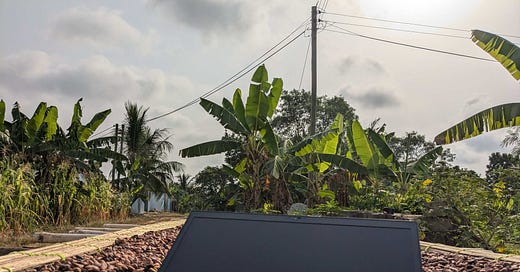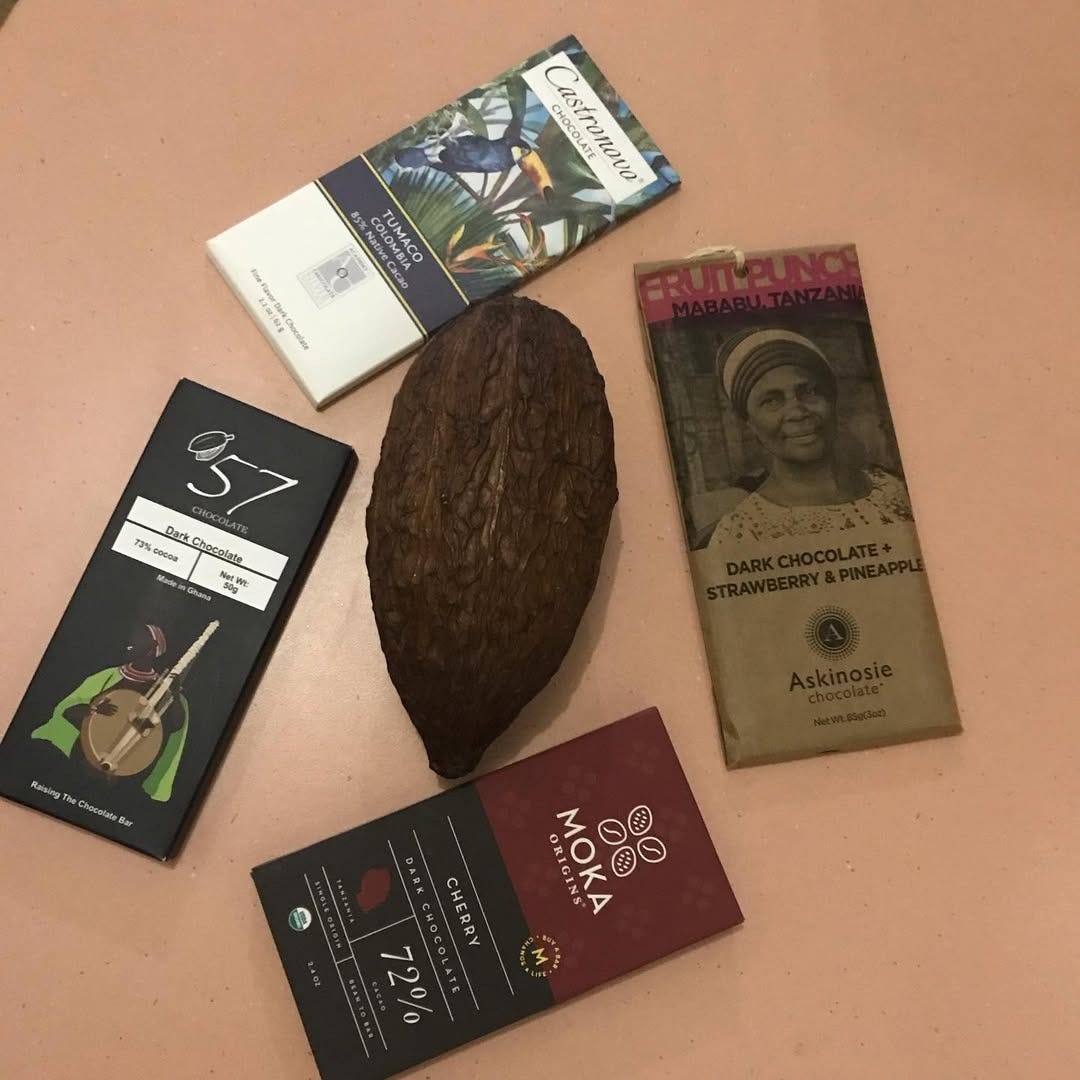👋🏾Hello there, how are you?
Lately, I’ve been thinking about how chocolate lovers can access more stories about the roots of their favorite confectionery. This piece is one of the many things on my mind, and I hope you find it useful.
If you’re new to my letters, thank you coming. Read the archive to catch up.
Now, let’s begin…
It was a cold February evening in France1.
I sat in front of my computer, arranged four bars of chocolate beside it, and, for the first time, clicked the Zoom link to join Estelle’s virtual chocolate tasting.
Estelle Tracy founded 37 Chocolates, where she introduces people around the world to craft chocolate2. She’d often meet them in-person in the US. When it’s virtual, she ships the chocolate bars to them and then meets on Zoom to taste and talk. I find it cool.
Anyway, this moment was in Black History Month, 2023. Estelle wanted her audience - spread across the US, Europe, Asia - to hear stories about the people behind chocolate made with cocoa beans from Ghana, Tanzania, and Colombia. I was the guest speaker.
We tasted four bars from Castronovo, Askinosie, Moka Origins, and '57 Chocolate. In-between discussions of the tastes of each bar, I told stories from my cocoa research adventures in Ghana with Dr. Kristy Leissle.
One of those stories was about the late Razack. He loved his cocoa so much that in his own words, ‘When I see a cocoa pod attacked by disease, I also feel sick.’ I had never felt such a passion for farming.
Another was about Ama Agyapomaa3. She couldn’t go to school as, in those days, school was a thing for boys. But she vowed to ensure her little sister Felicia had the best classroom education she could afford, and she sponsored her through to the tertiary level.
These stories inspired me to start African Cocoa Stories, so it was a pleasure to share it with chocolate lovers far away. Oh, and I was freezing, but Estelle’s humor made it a warm experience. Plus, the audience was curious, so I answered some interesting questions.
After two hours, it all ended. People began to leave the Zoom call.
But an African American woman—a regular patron of Estelle’s tastings—stayed back to chat. We talked for a bit. She encouraged me to tell more stories about cocoa farmers. Then she said something like this:
“Your stories made the chocolate taste much better.”
It’s been two years since Estelle’s Zoom meeting ended. I’ve forgotten this woman’s name, and her face. But I vividly remember her slow Afro-American accent, and the immediate warmth I felt from the words she spoke.
In fact, a few months when I had to decide whether to stay in France or return to Ghana, her voice rang in my head. And when I had to choose between doing African Cocoa Stories part-time or full-time, this voice rang in my head again.
But…
“Your stories made the chocolate taste better?” What does that even mean?
We could talk about the science of stories’ influence. But that’s not what matters most here. Instead, my highlight from conversation is this:
Chocolate lovers are curious about the cocoa supply chain.
They want to hear stories about the people who grow cocoa, where they live, their culture, and exactly how they grow this crop for chocolate to happen.
I know this, not just because of that woman’s statement, but because in the past nine months, whenever I told a chocolate lover about African Cocoa Stories, they’re like ‘Wow! Can you send me a link? I’d love to read it!’.
For me, this is always an important piece of feedback—an encouragement to continue the work I’m doing.
But this is also a sign that as an industry, craft chocolate has a unique opportunity to connect more chocolate lovers across the globe to the invisible people and cultures that make chocolate possible.
Craft chocolate is chocolate with a story. It sparks conversations—not just about flavors and the process of making it, but also about the men and women far away whose labor is at the very beginning.
Thus, at chocolate tastings such as Estelle’s, people who may never hear about Ghana or Tanzania can, for the first time, meet farmers like Ama, Paulina, Turkson, and Acheampong, whose hands care for cocoa before it becomes chocolate.
That said, I’d like you to do me a favor:
If you enjoy craft chocolate, ask your chocolate maker to tell you about the people who grow their cocoa. You may learn something interesting to make your chocolate taste better.
If they’re not able to tell you, send me a message. Because they might be victims of a flaw in the cocoa supply chain.
And in my next letter, I’ll discuss this flaw. Until then…
Thanks for reading. And take good care of yourself.
and Precious Elikplim gave feedback on this piece.
From October 2022 to May 2023, I taught English in France.
What is Craft Chocolate? - Chocopedia - Cocoa Runners






…i love it and so very true about pretty much any artistic experience…the more story we add to a wine or a record or a chocolate the more depth we might have with its experience…it is really cool you get to have know and share these stories…